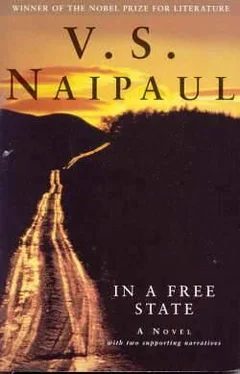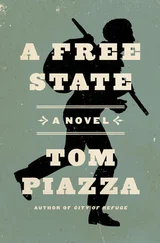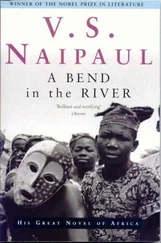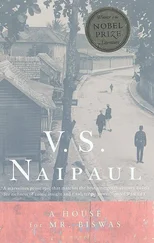Vidiadhar Naipaul - In A Free State
Здесь есть возможность читать онлайн «Vidiadhar Naipaul - In A Free State» весь текст электронной книги совершенно бесплатно (целиком полную версию без сокращений). В некоторых случаях можно слушать аудио, скачать через торрент в формате fb2 и присутствует краткое содержание. Жанр: Современная проза, на английском языке. Описание произведения, (предисловие) а так же отзывы посетителей доступны на портале библиотеки ЛибКат.
- Название:In A Free State
- Автор:
- Жанр:
- Год:неизвестен
- ISBN:нет данных
- Рейтинг книги:5 / 5. Голосов: 1
-
Избранное:Добавить в избранное
- Отзывы:
-
Ваша оценка:
- 100
- 1
- 2
- 3
- 4
- 5
In A Free State: краткое содержание, описание и аннотация
Предлагаем к чтению аннотацию, описание, краткое содержание или предисловие (зависит от того, что написал сам автор книги «In A Free State»). Если вы не нашли необходимую информацию о книге — напишите в комментариях, мы постараемся отыскать её.
«V. S. Naipaul tells stories which show us ourselves and the reality we live in. His use of language is as precise as it is beautiful.» – The London Times
«A Tolstoyan spirit…The so-called Third World has produced no more brilliant literary artist.» – John Updike, The New Yorker
«The coolest literary eye and the most lucid prose we have.» – The New York Review
In A Free State — читать онлайн бесплатно полную книгу (весь текст) целиком
Ниже представлен текст книги, разбитый по страницам. Система сохранения места последней прочитанной страницы, позволяет с удобством читать онлайн бесплатно книгу «In A Free State», без необходимости каждый раз заново искать на чём Вы остановились. Поставьте закладку, и сможете в любой момент перейти на страницу, на которой закончили чтение.
Интервал:
Закладка:
The colonel, dressed as before, was at his table. He had almost finished breakfast; he was drinking tea and reading his book. Bobby, in his yellow native shirt, forgot about the lake and the light; and, left hand at his side, right hand swinging, made – his swift, grim passage to the only other table that had been laid. Seated, his face set, he looked at the colonel; but the colonel was reading. Crumbs on the tablecloth, disorder in the butter-flecked marmalade: Linda had been down already. Grimly, Bobby buttered a piece of cold toast.
'News not so good this morning,' the colonel said. His voice was relaxed and casual. 'Still, I suppose the sooner this thing's over the better for all of us.'
Bobby, biting on his hard toast, gave a brief, blank smile. The colonel didn't see; he was turning the page of his book.
Timothy, his smell sharp in the light morning air, offered the breakfast card. The card was as dingy as the red-checked waiter's rag Timothy flicked about the table. His gestures were freer this morning. He was almost skittish, almost familiar, and he appeared anxious to talk. With every friendly flick of his rag he released a little more of his smell.
Another lorry went grinding past the hotel.
'Army's on the move this morning,' the colonel said. 'Not a time to be on the road, when our army's on the move. I always give them a wide berth myself.'
'I imagine the road's still wet,' Bobby said.
'Oh, one or two of those lorries are going to come to grief down some precipice or the other.'
The colonel smiled directly at Bobby. The colonel looked older this morning; but there was no strain irt his face; the flesh around his eyes and mouth looked softer and rested.
Bobby was uncertain about the joke.
The colonel noticed. 'They're going to leave the road in an awful state.'
'But I imagine. it'll dry out pretty quickly,' Bobby said. 'With this sun.'
'Oh, with this sun it'll dry out in no time at all. No time at all. By lunchtime, I'd say.'
It was like an invitation to linger; it was unexpected. But Linda had been down; she and the colonel had no doubt talked.
A car came into the yard. A door slammed. The colonel put a marker, a polished strip of bamboo shaped like a paper-knife, clearly an old possession, in his book; and waited. He appeared to know who the visitor was.
It was Peter, coming in from the bar with his light athletic steps. He was in khaki this morning: the khaki trousers of the previous evening, an ironed khaki shirt with epaulettes and button-down pockets. His sleeves were rolled up; there was a big wristwatch with a shining stainless-steel strap on his left wrist. His arms were bony, the muscles slack; the crinkled loose skin around his elbows showed that he was older than he looked. He carried two or three handwritten lists; he must have been out shopping.
When he saw Bobby, Peter paused, bowed and smiled and said in his English accent, 'Good morning, sir.'
There was no irony in the smile. It was like the smile of an old acquaintance. It didn't go with the bow; it was part of Peter's disjointedness. Like his clothes, like the bow, like the accent, Peter's smile was only one part of his training, and it was separate from the other parts. Like Carolus and Timothy, Peter belonged to the hotel and the boys' quarters of the hotel. It was disturbing; as always in former settler haunts, Bobby felt he was trespassing.
Peter stood easily by the colonel's table while the colonel went through the lists. When Peter went away, after bowing again to Bobby and smiling, the colonel stood up, holding his book against his chest. He steadied himself and threw back his shoulders. Then he hesitated, as though listening to the whine of the army lorry on the boulevard.
He smiled at Bobby and said, 'At times like this I always feel that the nearer you are to an army camp the safer it is. They're more under control. I don't know whether you were here for the mutiny. Even the witchdoctor ran away. Nobody knew where he was for a week. But it was perfectly all right here.'
Again Bobby was uncertain.
'Of course it'll all blow over in a day or two,' the colonel said. 'Everybody'll be calmer. Day or two.'
Bobby wasn't sure, but he thought the colonel was asking for company. He said, 'We're a day late as it is.'
'We'll give you an early lunch. You'll get to the Collectorate well before the curfew.'
'So that's official, the curfew?'
'Four o'clock. We'll get you off in good time.'
Later Bobby came downstairs to find Linda in the verandah. She was looking at the bright lake through her dark glasses. She had changed her shirt but was wearing yesterday's blue trousers; there were faint dusty stains where the mud had been brushed off.
She said, 'Has the colonel told you?'
She moved away without waiting for his reply. They were still quarrelling.
Bobby was in no mood to talk; he especially wished to be spared the colonel's disquieting company; and he decided, with relief, to go grim. Grim-faced, he looked through the paperbacks in the office, war stories, historical romances; made a selection; and settled down in a red-painted wicker chair in the verandah to a sulky read.
Linda attached herself to the colonel. They sat in the open office and Bobby heard the colonel talking. They walked about the yard, the garage, the garden, the quarters, and Bobby heard the colonel talking. They sat in the colonel's open room; they came out and stood in the hotel gateway. The colonel appeared to recognize this gateway as a boundary. He kept within the gravelled yard and never stepped on the concrete that sloped down to the asphalt of the boulevard.
At intervals the army lorries rolled slowly by. Below green forage caps the fat faces of the soldiers were expressionless and still matt-black from their morning wash.
The air lost its morning freshness; the light became hard; and Bobby, not held by the paperbacks, began again to feel something of the desolation of the derelict resort. Carolus came into the bar, dusty-headed, oily-skinned, in his old black trousers and tight red tunic, as though he hadn't taken off his clothes or washed since the previous evening. He moved noisily about the bar with broom and rag, taking long, skidding steps, as if in imitation of Timothy. Then he saw Bobby in the verandah. Carolus didn't come out to the verandah. He retreated with his broom and rag and stayed in the bar, out of sight. Bobby didn't move. He put his book face down on his knees, looked at a point in the yard, and frowned. He heard Carolus moving quietly in the bar, trying not to draw attention to himself.
The colonel and Linda were still together, but there were now passages of silence between them. When they came and sat at Bobby's table, for coffee, Bobby saw that they had done so because they had exhausted the mood that had been created by their conversation.
Bobby, still grim, made no effort to talk. Neither did Linda, half smiling behind her dark glasses. And the colonel seemed to have nothing more to say.
Bobby thought: he'll start talking about Africans. Carolus stood in a doorway with the coffee-tray.
The colonel said, 'It looks as though the lorries have stopped.' Bobby looked at Carolus and then stared into space, demonstrating his capacity for sternness, even in the colonel's company. Carolus became quite stupid and heavy with fright.
'What gets me, you know,' the colonel said, setting out the cups with his firm, square hands, 'is the way those Africans manage to look so downtrodden as soon as they're obeying orders. Did you see those drivers? Driving very, very slowly, and looking very, very downtrodden, as though they'd all had the rod this morning. It's only because those instructors are looking on.'
Bobby, not talking, tilted his empty cup to study a flaw in the glazing.
Читать дальшеИнтервал:
Закладка:
Похожие книги на «In A Free State»
Представляем Вашему вниманию похожие книги на «In A Free State» списком для выбора. Мы отобрали схожую по названию и смыслу литературу в надежде предоставить читателям больше вариантов отыскать новые, интересные, ещё непрочитанные произведения.
Обсуждение, отзывы о книге «In A Free State» и просто собственные мнения читателей. Оставьте ваши комментарии, напишите, что Вы думаете о произведении, его смысле или главных героях. Укажите что конкретно понравилось, а что нет, и почему Вы так считаете.











